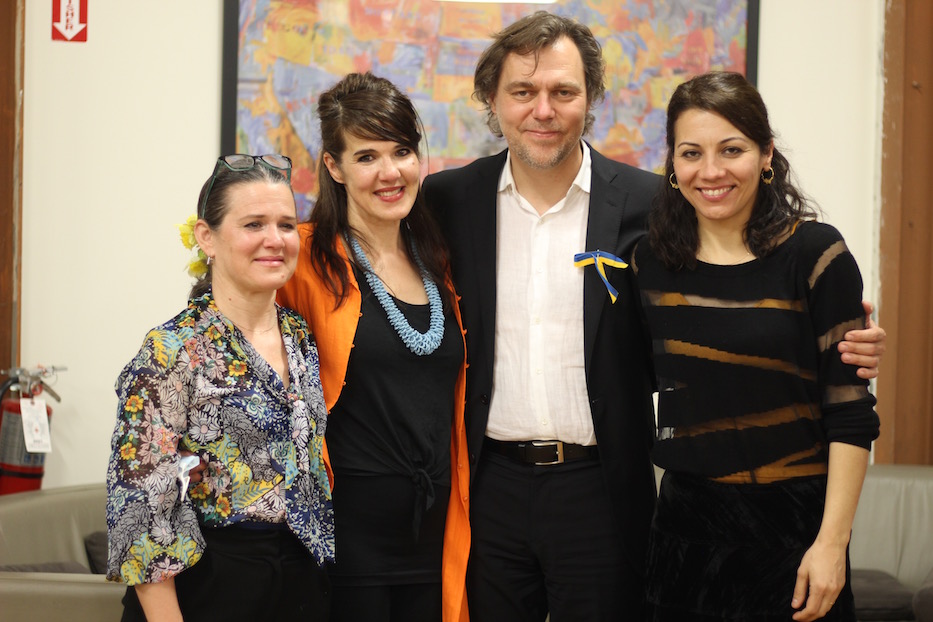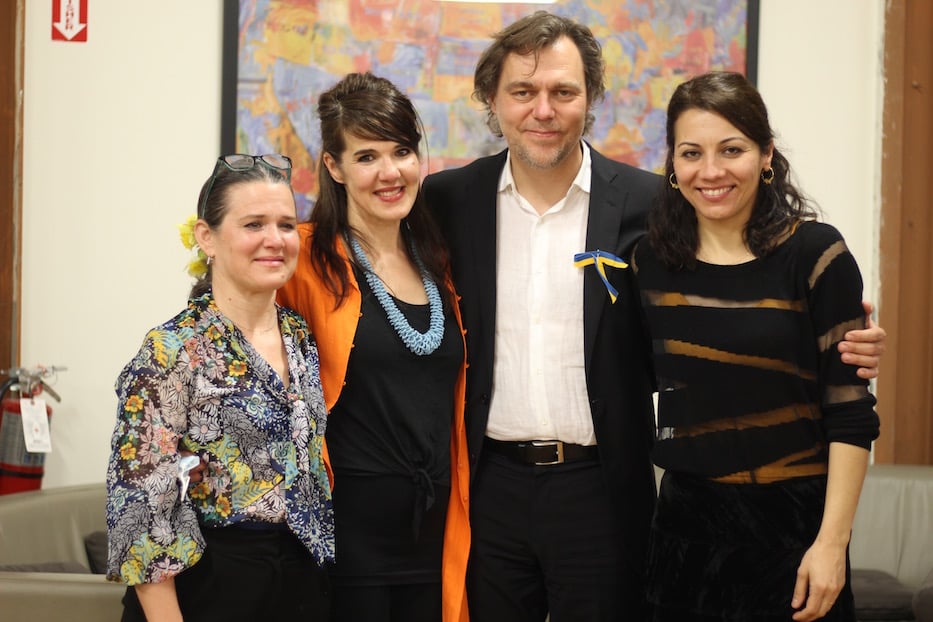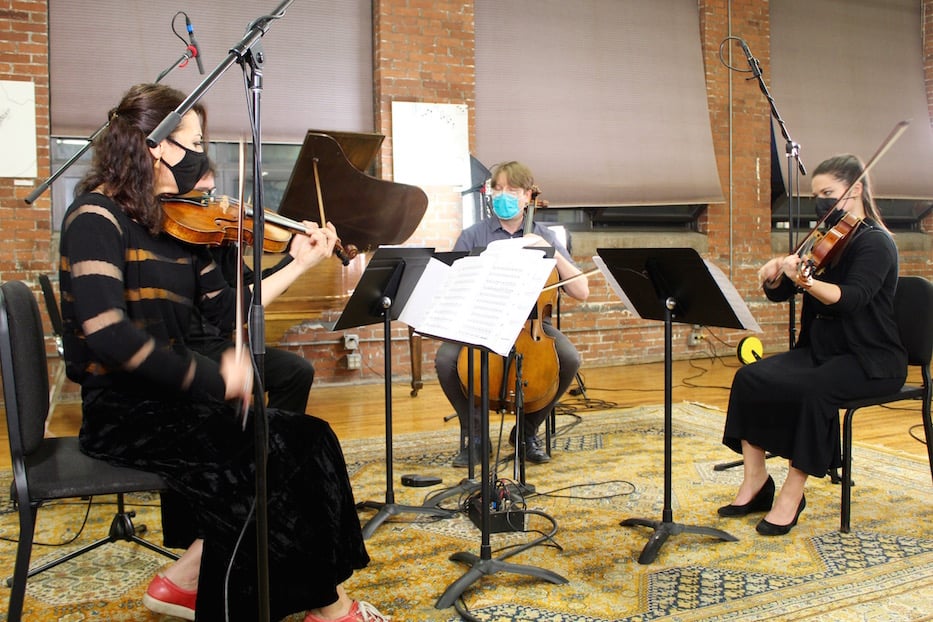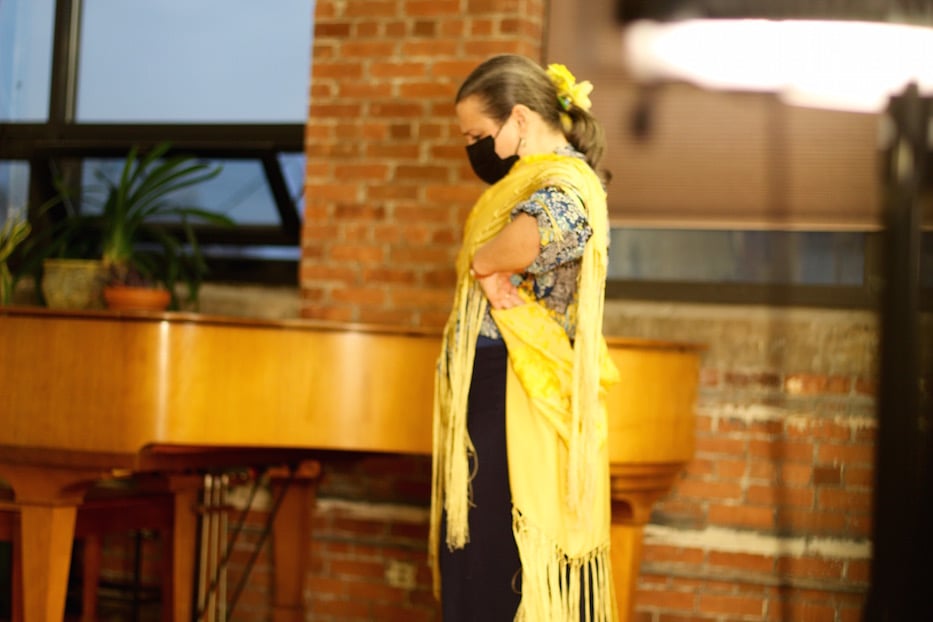
Fair Haven | Music | Arts & Culture | Music Haven | Ukraine

Wendy Clinard, Susan Clinard, Andrius Žlabys and Yaira Matyakubova. Lucy Gellman Photos.
Andrius Žlabys touched the piano with the tips of his fingers, as if he was reaching out to feel a piece of rubble in his hands. Halfway across the world, composer Victoria Polevá was trapped in Kyiv, bombs falling around her. Žlabys bore down, and leaned in as the melody grew louder. He began to move with the music, his mouth a thin, drawn line. For a moment, it was as if Poleva was standing in front of the piano.
Just feet away, beyond a hushed audience, a blue and yellow Ukrainian flag hung still on the wall, as if it too was holding its breath.
Žlabys brought that performance to Erector Square last Thursday night, as members of the Haven String Quartet and wider Music Haven family gathered for a benefit concert for Ukraine. Throughout the evening, artists used music, dance, visual art and poetry to channel a deep, sometimes bottomless sense of sadness—and a reminder that a kinder, more humane world is possible. Roughly 50 people gathered at the organization’s 315 Peck St. home, with more online.
Funds went to the United Ukrainian American Relief Committee and Misto-Dobra. The first is a general humanitarian aid organization and the second is a shelter for women, children, and now elders, with resources so stretched by the war that it is building a second location. People who still wish to donate can do so directly through Music Haven’s website.
"Up until February 24, nobody really believed that this [the war] was going to be a reality, " said Music Haven Artistic Director Yaira Matyakubova, a violinist who took the lead on organizing the event. "In a matter of weeks, complete devastation. There hasn't been a day that I haven't cried. I wanted to do something, and the response from the artists ... it was so beautiful what they did."
The fundraiser came together in under a week, as Matyakubova, pianist Andrius Žlabys, and members of the Haven String Quartet (Matyakubova and Gregory Tomkins on violin, Annalisa Boerner on viola and Phillip Boulanger on cello) began thinking about what they could do as musicians to contribute to relief efforts in Ukraine. All of them felt they “wanted to do something,” Matyakubova said—and realized that they could make a difference with their craft.
As they built a program, sculptor Susan Clinard and her sister, flamenco dancer Wendy Clinard, also came onboard to help. Music Haven parent Ian Melchinger, a teacher at the Hopkins School whose daughter Isabel is a cellist, stepped in to run a livestream for people who wanted to attend virtually. Musicians created a set that bridged past and present with music from the U.S., Germany, and Ukraine.
"I really believe that the strength of art is in its truth," Matyakubova said. "And the truth—it goes through the time. It goes right into the hearts of people. And I feel that it's really important to tune in and be together in a situation like that."
Building A Bridge

Throughout the concert, musicians played their way through a thick, heavy kind of sorrow to a place of resolution, weaving a story in strings, pounding keys, and stomping, percussive feet. Walking onto a makeshift stage early in the evening, members of the Haven String Quartet launched into Samuel Barber's "Adagio for Strings" before even announcing the title. As they sat in all black, it looked as if they were playing in a funeral.
The work started as a deep, uninterrupted breath, violins so smooth and quiet they seemed as if they had always been there, waiting. Cello joined in, gliding forward under the weight of something just out of reach. As strings rose and pressed into each other, the Peck Street space became a cathedral of sound. Their voices swelled around the cry of the viola, so melancholy it seemed like they were coming from the inside of someone's broken chest.
They built to a smoldering, ethereal climax and nearly swallowed the audience whole. If a listener closed their eyes, it wasn't hard to see a montage of horror that has included cities and villages decimated by war, families mortally ripped from each other, and constant terror in the country's subway stations, villages, hospitals, and streets.
As if on cue, the sky outside opened up for one of the spring's first heavy storms, releasing buckets of rain onto Peck Street and the parking lot below. A warm, earthy scent rose up from the soil, where flowers and blooms had yet to appear. In Ukraine, it was almost 3 a.m., and the country was bracing itself for another day of shelling and bombardement. Back inside Music Haven, strings burrowed back into the place they had begun. When Boulanger stood to announce the name of the work—which has scored presidential memorials and helped a nation grieve after September 11—some members of the audience had yet to exhale.

That sense of mourning and resistance, of despair and possibility, permeated the space for the next 90 minutes, as artists cycled between the stage and the audience. As Wendy Clinard and Matyakubova sank into "Tientos por Bach," their collaboration became a call-and-response, in which Clinard's feet, hands and arms responded to the violin.
On one side of the room, Clinard wrapped a Ukraine-yellow shawl around her shoulders, channeling the fringed, bright hustkas that have become a mainstay at Ukrainian church services and rallies against the war. A yellow flower rested in her hair. Violin dipped, and Clinard started to spin, her arms and wrists winding upward. It gave her an opening, and she responded with a sharp, staccato snap. When she threw her scarf down and began to move around it, it was as if she was looking for a homeland and not quite sure where to go.
Minutes later, her sister Susan urged attendees to summon an image of the war, "however awful or stark" it may be. A collective breath ran through the audience, which went four rows deep.
"Sit with it in your mind," she said. "Let it sit in your consciousness as you continue to listen to that music. Each of us will have a different image in our minds and hearts. And in our own way ... I'd like to believe that we will collectively send love to those who need it right now."
In each work, those images from the war—and a constant, churning news cycle—never seemed far away. When Žlabys approached the piano with his “Movement for String Quartet and Piano,” written after Russia's illegal annexation of Crimea, it was the discord of a country in ruins, where buildings have had their faces blown clean off and grandmothers die in line for groceries. Beneath strings that quickly unraveled, a persistent tapping of the keys became a storm, yielding to a quieter moment only after the damage had been done.
When he returned with Dmitri Levkovich’s "Andante" from Piano Trio, it was the story of people who belong to each other, of spring springing wildly into bloom despite a world turned on its head. By Robert Schumann's "Fantasiestücke, Op. 12," musicians' hearts and minds had traveled to another place entirely, no longer completely in New Haven.
Boulanger, who dedicated the piece to a Ukrainian roommate he'd met in Poland, noted that he couldn't stop watching the news. He later swayed so fervently to the work, his body nearly an extension of the cello, that his glasses flew off and landed a foot away on the carpet. He didn’t pick them up until the end of the piece.
Nowhere was Thursday's outpouring of feeling more acute than in Polevá's "Passacaglia," a contemporary Ukrainian work that channels the total and senseless destruction of a physical place. Before playing the piece, Žlabys described the process of reaching out to Polevá, who is still based in Kyiv. When he asked her if she was safe, "she said, 'they're bombing the city, but I'm okay,'" he recalled.
Polevá worried that a collection of her work, soon bound for a publisher, would never make it out of the city. She sent it to Žlabys. He selected "Passacaglia" as a piece that captured and distilled the total devastation he was seeing, he said. In the work, piano takes on its own voice, building slowly until suddenly a musician is pounding on the keys, and the space is engulfed in a world upturned and cacophonous. It leaves the whole room spinning.
"It really got to me," Žlabys said in an interview after the concert. "The emotional content, the tragedy of this piece, was beautifully, artfully expressed."
When the quartet closed with Myroslav Skoryk's 1981 “Melody,” which has become ubiquitous since its role in the movie The High Pass over 30 years ago, it was the image of something else: open borders, warm meals and strollers waiting at train stations, churches that have agreed to help resettle refugees. Even under the strain of the piece, it was the sound of another, kinder world, just beneath the surface of the current one.
A Reminder Of Home
For both Matyakubova and Žlabys, Russia's campaign of terror also deeply personal. Matyakubova grew up in Tashkent, the capital of Uzbekistan, in the 1980s and 1990s, when the country was separating from the former U.S.S.R. When she came to the U.S. at 16 to study music, she had a backpack of clothes and her violin. She was amazed by the kindness Americans showed her, first at the Interlochen Arts Academy in Michigan, and then in Florida, Texas, and in New Haven.
"I didn't have any money, or any friends, I didn't have the language–I didn't know anything," she said. "People were very patient with me, and very generous with their time and friendship. I have a lot to give back."
When she sees photos of bodies in the streets, of long lines at the Polish and Romanian borders, of Ukrainian homes flattened to the ground, she sees flashbacks of her own home city decades ago.
Žlabys,who grew up in Lithuania, said he has a similarly visceral experience. When he discovered, received and played through Poleva's work for the first time, he was moved by the sheer emotion on the pages. During his lifetime, Lithuania has seen brutal and unprovoked Soviet attacks and continued grabs at power, including a large-scale attack on civilians three decades ago.
"Obviously as a small country who also had our share of historical treatment from Russia ... that gives another level of understanding," he said. "It's just kind of hard to believe that such horrible things can happen, and the whole world is watching.”
That was also true for Lyala Stowe, a Ukrainian immigrant who came with her husband and children to read Ukrainian poetry. Before the quartet closed with "Melody," Stowe stood before the audience, her voice quiet but steady. In her hand, she clasped a copy of Taras Shevchenko's nineteenth-century poetry. Her children watched from the side and back of the room.
The poem "is more simple, but more representative of how we love Ukrainian language, being a singing language," she said, explaining that Shevchenko wrote with great affection for his country despite the fact that his social standing made him a serf. "I'm sorry you won't be able to understand the words, but I would like to read it."
As she read in Ukrainian, the words ebbed and flowed over the audience, sometimes ringing out and then becoming soft, rolling like the sun-dappled landscape they described. Attendees leaned in to listen, completely silent as Stowe looked at the page, then back at them, something short of a smile on her face. As she finished, her voice splintered.
"I believe there's some connection and some beauty that gets translated regardless," she said. "And I believe there is pure evil that's happening."
The past months have been excruciating, she said in a phone call Monday. Stowe grew up in Chernihiv, a city in the North of Ukraine that fell after Mariupol and Kharkiv. After coming to the U.S. as an exchange student at 15, she returned for college, and later for her graduate degree at the Yale School of Management. She now works for Planned Parenthood Federation of America.
When the war began at the end of February, her mother was still in Ukraine. For three weeks, she lived in a basement without water or electricity. Stowe, from her home in New Haven, worried constantly. She was finally able to flee to Bulgaria, where she is now safe.
Stowe is also angry at the amount of misinformation that Russia has continued to spread, she said. While Ukrainians fear for their lives, extended family members in Russia have continued to deny what is happening. They include a third cousin who was close to Stowe and her family before the war. Now, she will not believe that Putin is responsible for bloodshed across the country.
"It is heartbreaking," she said of the war. "What a waste of human life."
She added that despite "a mortal fear of public speaking," she was grateful for the chance to read on Thursday.
"It was such good energy," she said. "There was just love and beauty and support."
Music Haven's next concert, "HSQ Presents: Letters From Iraq," is May 14 at 7:30 p.m. at the Unitarian Society of New Haven. Tickets and more information are available here.

